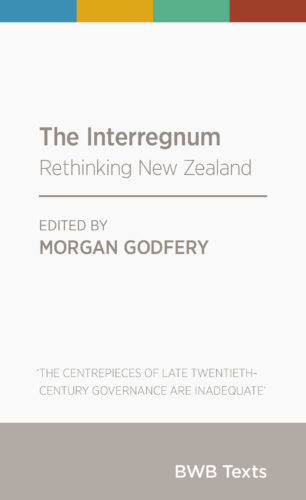
This reading carries on from here.
The sixth essay in The Interregnum is ‘Radical Kaupapa Maori Politics’ by Carrie Stoddart-Smith. Turning to maoridictionary.co.nz I discover that kaupapa means, in this context, something like ‘agenda’ (indeed, within the first page it has been defined as “something like first principles”), but the essay itself explores the various definitions of ‘Kaupapa Maori’.
At the core of this essay is the question that Maori have been asking themselves for 200 years. To what extent to we cling to the old ways, and to what extent to we abandon them for the sake of adaptation to a world that is different to what it was when the old days arose?
Many mainstream readers, conditioned to mainstream journalism, will find the tone of this essay jarring, as it is heavy on the kind of guilt-based sermon-style rhetoric that so many have learned to manipulate otherwise well-meaning audiences with.
It’s also full of the unnecessary race-baiting and shit-stirring that has become associated with the American style of race rhetoric, such as when Stoddart-Smith justifies the exclusion of non-Maori with “empowering Maori voices that continue to be silenced by the noise of history, and by the protestations of white New Zealand that insist on shouting us down and shutting us out.”
Unfortunately this dishonest, deliberately aggravating style of rhetoric is a throwback to the Cultural Marxism espoused in the introductory essay. Only “white New Zealand” is the enemy; the fact that Asian and Pacific Islander New Zealanders think much less of Maoris than white people do, not having had two centuries of living together, is ignored on account of not fitting the narrative (the fact that Asians and Pacific Islanders are harder to guilt trip may also be a factor).
It’s a shame that a confrontational and antagonistic stylistic approach was taken, because there’s plenty of philosophical value in this essay. In particular, Stoddart-Smith draws multiple parallels between kaupapa Maori and the anarchist philosophy of mutualism.
After all, pre-European contact Maori did not have a central government, and as a consequence they adapted to learn patterns of mutual support that helped them and their neighbours to survive. In some cases the agreements over which tribe had the rights to access what were very sophisticated and complicated, but the important thing was that they were mutually consensual, in contrast to today’s arrangement where representatives of the Queen enforce the law whether people like it or not.
If this side of things had been emphasised, this could have been a good essay. Unfortunately it’s full of common separatist canards like “colonialism embedded patriarchy in tikanga Maori” and the revisionist attempt to ignore He iwi tahi tatou, as if the historical nature of interactions between Maori and British settlers had been entirely involuntary on the part of the Maori, rather than mutually beneficial.
One feels that a sophisticated approach to redressing the historical wrongs done to the Maori people, and this essay falls a long way short of that. It is, however, a good example of Marxist agitprop.

I find your suggestion that people of European descent are more prone to guilt tripping to be very interesting. I don’t think I can remember a time when ‘the white man’s burden’ was not a topic of debate and soul searching amongst the white people I have known. is it necessary?